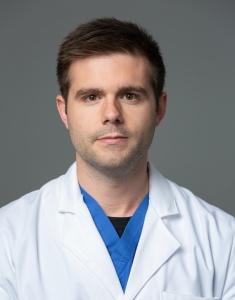
Dr. Aaron Vose is a second-year Pulmonary and Critical Care Medicine fellow at Duke University who aspires to be a physician-scientist studying the impact of chronic disease on lung injury. His training allows for 16-18 months of research time over the second and third years of his fellowship. Aaron is supported by a T32 training grant from the National Institutes of Health, which helps “prepare qualified predoctoral/postdoctoral trainees for careers that have a significant impact on the health-related research needs of the Nation.” He said, “I intentionally consolidated my clinical time to allow for a concentrated, uninterrupted period of lab time—time necessary for an early-stage investigator to build important, foundational data for future grant award applications.” Because of the COVID-19 pandemic and its impact on labs spaces, which have been closed and are only recently beginning to open up, Aaron’s plans were interrupted. He noted, “Our labs have been closed throughout the period that I had previously been afforded for research time, and there is only so much that can be done without generating experimental data.”
In addition, Aaron said that trainees in pulmonary and critical care medicine are disproportionately affected by the pandemic from a clinical-demand standpoint. “As our critically ill COVID-19 patient demand swells, so too does our time spent away from our research endeavors. Our division has created surge scheduling that relies on everyone to adequately staff our patient care units.” Aaron notes that “while this is certainly our duty and an important task, the research time lost during fellowship cannot be replaced, setting back the career aspirations of many developing scientists and clinical researchers.”
Aaron feels that the ultimate impact of these research interruptions on patients over the long term is unknown, but he suggests that they will be negatively affected. “Increased clinical demands and delays in experiments exploring mechanisms of lung disease, pulmonary physiology, and potential therapeutic targets will undoubtedly shunt multiple generations of fellows away from research and into the clinical arena, further depleting the physician-scientist backbone of the academic medical institution. This will lead to set-backs, not only for the individual, but perhaps more importantly in scientific discovery, which will undoubtedly harm patients over the long term.”
In addition to barriers to completing research due to COVID-19, Aaron has lost valuable opportunities to network professionally and to attend conferences which could further his scientific collaborations. These are significant to investigators in the early stages of a career trying to establish their scientific career pathway.
Aaron is faced with extending his training and adding another year to his fellowship. With limited access to the lab, he does not feel he will have the preliminary data to submit an NIH grant application this year. Aaron’s work is particularity important as COVID-19 infects more individuals every day. He said that “over the past six months, the importance of scientific research in pulmonary medicine has been realized on an almost daily basis and has been reflected in the breakthroughs in the understanding of COVID-19 disease, and translated into better care for COVID-19 patients.” Though Aaron has experienced roadblocks to his training as a physician scientist, he remains hopeful. He said that “as a pulmonary fellow and young physician-scientist, I am hopeful that better days are ahead, but ultimately worry about the long-term consequences of the pandemic on scientific discovery.”
Investments in the training of physicians have a significant return. Duke Health Government relations is urging Congress to address the consequences of this unprecedented pandemic on our nation’s biomedical research and scientific enterprise and workforce. The goal is clear, we need to provide relief for the research enterprise now to ensure we do not delay or lose the scientists we need to make progress on devastating diseases like COVID-19. How can Congress help? Read on